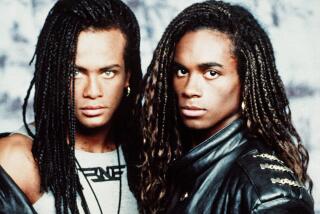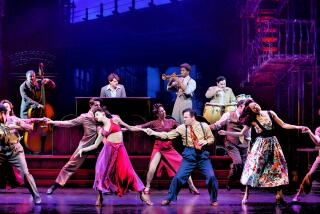Frankie Valli and Bob Gaudio’s uneasy relationship with ‘Jersey Boys’
- Share via
As it hopes to draw moviegoers in its second weekend who didn’t turn out for its first, “Jersey Boys” offers a summer counterprogramming cocktail of sorts. Clint Eastwood’s stage-derived film about Frankie Valli and the Four Seasons tells the story of a throwback group, comes from a throwback director and offers the throwback appeal of actors better known for their chops than their ability to attract tabloid or financier attention.
There’s something else throwback about the film too, or at least timeless: subjects who haven’t always been thrilled with the process.
Valli and his creative partner, writer-keyboardist Bob Gaudio, were very involved in the development of both the show and the movie. And they weren’t quiet or enthused.
“It was an interesting journey,” Marshall Brickman, who wrote both the show’s book and movie’s screenplay said diplomatically when asked about the pair’s input.
Valli was quick to raise an eyebrow to narrative compressions or flourishes in the script he felt didn’t reflect the rags-to-riches-to-rags tale as it happened.
His main issue, both Eastwood and star John Lloyd Young suggested, were changes he thought didn’t do justice to his relationships and the band’s back story.
That issue may have been compounded given the competing recollections among members of the All-American group in the first place. When Young was first researching the role, he met frequently with Valli but soon found the Rashomon-style recollections of various band members made each an unreliable witness, including Valli. “I would learn more by what Frankie left out or what he didn’t want to talk about,” the actor said. (Both the show and movie deal with these clashing takes by allowing different players to narrate their version of the story.)
Eastwood said he thinks Valli, who was also regularly on set, is still ambivalent about the show though acknowledged with a wry smile that “I think he’s gone to see it almost 50 times.”
Ever the writer, Gaudio was fine with pretty much all artistic license, Eastwood said, though he would home in on any perceived musical inaccuracies. This was true, principals said, at the show level too.
“He’d sit in these tech rehearsals and his ear would go up like a dog’s if a note didn’t sound the way he thought it should,” said the actor Erich Bergen, who played Gaudio on stage and screen and would often be the one on the receiving end of the canine correction.
Brickman said that Gaudio’s concerns reflected a more exacting interpretation of the process than most veteran stage or screen writers have. “You don’t have the control over a movie that you do in a studio making a record,” he said. “Bob can hear sounds like nobody else and equalizations that no one else can hear,” he said, adding, “These are things you can’t reproduce in a movie theater.” (Neither Valli nor Gaudio were made available for interviews.)
Though the movie doesn’t always glamorize their backstage life, it takes a benign, even noble view of the two principals. Valli stands by bandmate Tommy DeVito even as the latter nearly brings down the group with his gambling debts. Gaudio comes off as a likable and talented guy who, though he forges a partnership with Valli separate from other bandmates, ultimately isn’t really trying to undermine anyone.
Musicians working through their feelings about their Broadway or Hollywood treatment is in the air this season. Carole King was conflicted about the take on her life in the current Tony-decorated hit “Beautiful.” She came around and eventually went to see the production and even performed at the Tonys with star Jessie Mueller. Still, don’t hold your breath for Valli to perform at any upcoming movie-award shows.
More to Read
Only good movies
Get the Indie Focus newsletter, Mark Olsen's weekly guide to the world of cinema.
You may occasionally receive promotional content from the Los Angeles Times.










